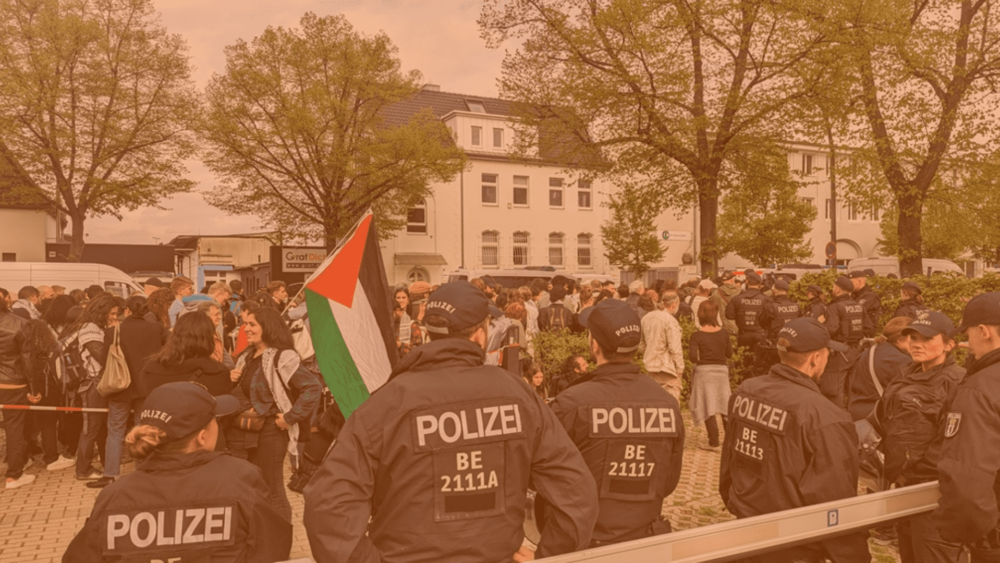A Palestinian Congress, held on April 12 in Berlin and organised mostly by Jewish activists, was surrounded by thousands of police officers, who interrupted it and detained participants. DiEM25 co-founder Yanis Varoufakis was banned from visiting Germany and from any kind of political activity, including Zoom calls. Nothing more, nothing less. For what reason? Because he opposes the genocide that the Israeli government is committing in Gaza and intended to speak about it, having, thus, been censored.
The same happened to British-Palestinian surgeon Ghassan Abu Sittah, rector of Glasgow University, who was prevented from entering the country by the German border authorities. Philosopher Nancy Fraser, an American academic of Jewish origin and international renown, also had her invitation to lecture at the University of Cologne in May abruptly cancelled by the university’s rector because she had signed a public letter for Palestinian freedom. These are dark times in Germany: cascading attacks on political and academic freedom, a so-called ‘progressive’ government that uses the police and censorship to prevent citizens, many of whom are Jewish, from criticising Israel’s extremist government and denouncing genocide.
This movement is not unprecedented. In the German press, there has been no hesitation in attacking many other left-wing intellectuals in recent months, such as Naomi Klein (also Jewish) for describing the Israeli government’s actions as ‘genocidal’ or Judith Butler (also Jewish) for her theses on apartheid promoted by Israel and her post-colonial theories. These attacks and criticisms are always made using the same slur: anyone who criticises the Israeli government is an accomplice of ‘antisemitism’.
There is no doubt that antisemitism is a form of xenophobia with old historical roots. In Germany, the commitment to combat antisemitism has a particular historical weight, due to the German state’s commitment to atone for its historical responsibility for the Holocaust. But it is profoundly wrong and contradictory to take the State of Israel as a monolithic substitute for all Jews under the pretext of Holocaust remembrance. This misrepresentation is in itself a form of prejudice, which operates through the same mechanism as any xenophobia. It openly ignores all the Jews who have historically opposed the Zionist project (Einstein, Arendt, Chomsky, to name but a few), as well as the Israelis who oppose its state’s colonial action, atrocious violence and genocide in Gaza.
In reality, equating all Jews with the Israeli government is a form of antisemitism. There is nothing antisemitic about the fight against the illegal colonisation of Palestine or the genocide in Gaza. On the contrary: it is a fight against the elimination of a population because it belongs to a certain group. If there is any lesson to be learned from Germany’s terrible Nazi past, it is that the moral abyss always lies in the political definition of a ‘chosen people’ and the categorisation of a particular people or entire nation as inhuman or unworthy, which is what the Israeli state has been doing for a long time.
The memory of the Holocaust should therefore be an antidote to any genocide, never an excuse, never an alibi, never a pretext for not wanting to see the crimes committed by Israel, never an altar to justify the sacrifice of thousands of innocent Palestinian lives.
Invoking the fight against antisemitism, the German state (including the main political parties from right to left) has embraced Israeli nationalism by proxy, which includes the stigmatisation and suppression of any expression of Palestinian identity and solidarity with Palestine, and even the threat of deportation depending on the perverse application of the ‘antisemite’ label.
So where, in this context of censorship and repression, are the voices that so exaltedly brandish their love of freedom of expression and their resentment of cancel culture? Where is the indignation against the blocking of journalists who want to cover the war and the occupation? Where is the revolt against the real ‘non-coverage’ of what is happening in Palestine? Where are the clamours for freedom of political expression in the ‘liberal democracies’?
Or is censorship good when it tries to silence anti-Zionist intellectuals, whether they are Jewish or not? If so, can they now be violently prevented from speaking?
This article was originally published by Expresso and has been translated and re-published with permission. You can read the original article here.
Do you want to be informed of DiEM25's actions? Sign up here















